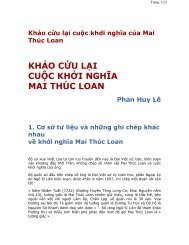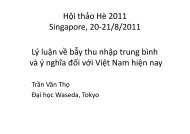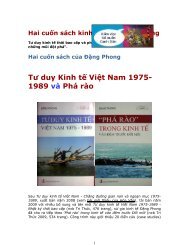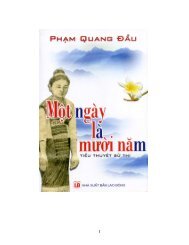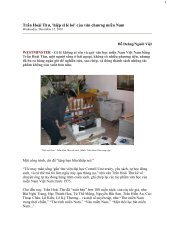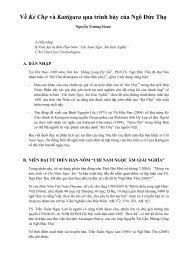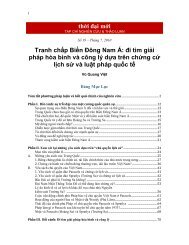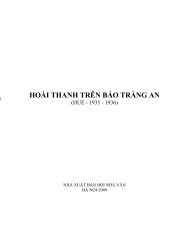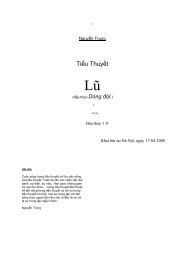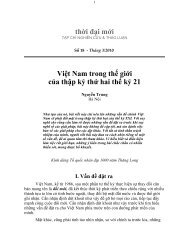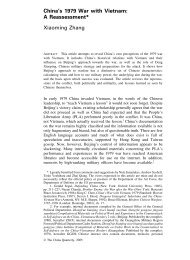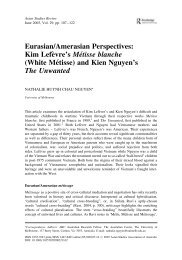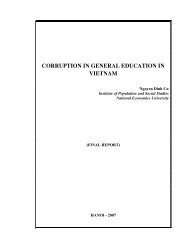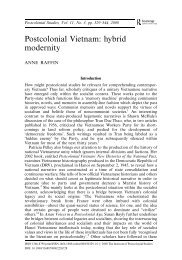John T. McNaughton and Vietnam: The Early Years as ... - Viet-studies
John T. McNaughton and Vietnam: The Early Years as ... - Viet-studies
John T. McNaughton and Vietnam: The Early Years as ... - Viet-studies
You also want an ePaper? Increase the reach of your titles
YUMPU automatically turns print PDFs into web optimized ePapers that Google loves.
BENJAMIN T. HARRISON AND CHRISTOPHER L. MOSHER 507<br />
<strong>and</strong> harder to pull out’ <strong>and</strong> the more difficult it becomes to end the<br />
dis<strong>as</strong>ter. 60 On 2 March 1965, <strong>McNaughton</strong> wrote a memor<strong>and</strong>um saying:<br />
‘I am concerned that we not rush in <strong>and</strong> take over the conduct of the war<br />
from the <strong><strong>Viet</strong>nam</strong>ese. I think that it would be a political <strong>and</strong> psychological<br />
mistake to change our p<strong>as</strong>t position that this is a <strong><strong>Viet</strong>nam</strong>ese war in<br />
which we are helping’. 61 Rush to make that very mistake the United<br />
States did, much against <strong>McNaughton</strong>’s better judgement.<br />
<strong>McNaughton</strong> w<strong>as</strong> sent to Saigon for a week in the spring of 1965 in<br />
order to see first h<strong>and</strong> how the war w<strong>as</strong> going <strong>and</strong> he drafted another<br />
memo during that time which suggested that, by introducing ground<br />
troops, the United States w<strong>as</strong> making the mistake which could lead to<br />
‘undesirable escalation or defeat’. He believed the United States should<br />
be prepared to accept a negotiated settlement <strong>and</strong> cut its losses. 62 In a<br />
redraft of that memo, dated 24 March, <strong>McNaughton</strong> introduced his<br />
famous equation of US Aims in <strong><strong>Viet</strong>nam</strong>:<br />
70% – to avoid a humiliating U.S. defeat<br />
(to our reputation <strong>as</strong> a guarantor)<br />
20% – to keep SVN (<strong>and</strong> the adjacent)<br />
territory from Chinese h<strong>and</strong>s<br />
10% – to permit the people of SVN to<br />
enjoy a better, freer way of life. 63<br />
<strong>The</strong> United States w<strong>as</strong> not in <strong><strong>Viet</strong>nam</strong> mainly for democracy but more<br />
so for its own perceived credibility. <strong>McNaughton</strong> had already argued<br />
that the United States’ global reputation w<strong>as</strong> hurt more by being in<br />
<strong><strong>Viet</strong>nam</strong> than by withdrawing. He seemed to suggest that the stakes in<br />
<strong><strong>Viet</strong>nam</strong> were not laid in concrete <strong>and</strong> that the United States could exit<br />
without serious consequences. He added that it w<strong>as</strong> important to emerge<br />
from the <strong><strong>Viet</strong>nam</strong> conflict ‘without unacceptable taint from methods<br />
used’. It pained him that a superpower w<strong>as</strong> crushing a small, primitive<br />
country with incredible force. He concluded that the United States w<strong>as</strong><br />
‘NOT’ in <strong><strong>Viet</strong>nam</strong> ‘to help a friend, although it would be hard to stay in<br />
if <strong>as</strong>ked out’. 64 He would have loved the GVN to <strong>as</strong>k for US withdrawal<br />
<strong>and</strong> speculated that an incompetent Saigon government could provide<br />
the excuse for a US exit with a request that Americans leave <strong><strong>Viet</strong>nam</strong>. In<br />
his view, the country’s reputation <strong>and</strong> credibility would be kept intact<br />
because the United States had <strong>as</strong>sisted the fight against communism<br />
<strong>and</strong> been <strong>as</strong>ked to leave. <strong>The</strong> scholars narrating the Gravel edition of the<br />
Pentagon Papers said that at the time ‘no one put it <strong>as</strong> starkly <strong>as</strong> Assistant<br />
Secretary of Defense <strong>John</strong> <strong>McNaughton</strong>’. 65 That included George Ball.<br />
60 Halberstam, Best <strong>and</strong> Brightest, p. 368.<br />
61 FRUS, 1964–1968, <strong><strong>Viet</strong>nam</strong>, ii. 390–2.<br />
62 JTM Papers, Box 1, File IV, 20 March 1965, LBJL; FRUS, 1964–1968 <strong><strong>Viet</strong>nam</strong>, ii. 193, drafted<br />
memo dated 9–10 March 1965.<br />
63 NYTPP, pp. 432–40.<br />
64 Ibid.<br />
65 GPP, iv. 22.<br />
© 2007 <strong>The</strong> Authors. Journal compilation © 2007 <strong>The</strong> Historical Association <strong>and</strong> Blackwell Publishing.



